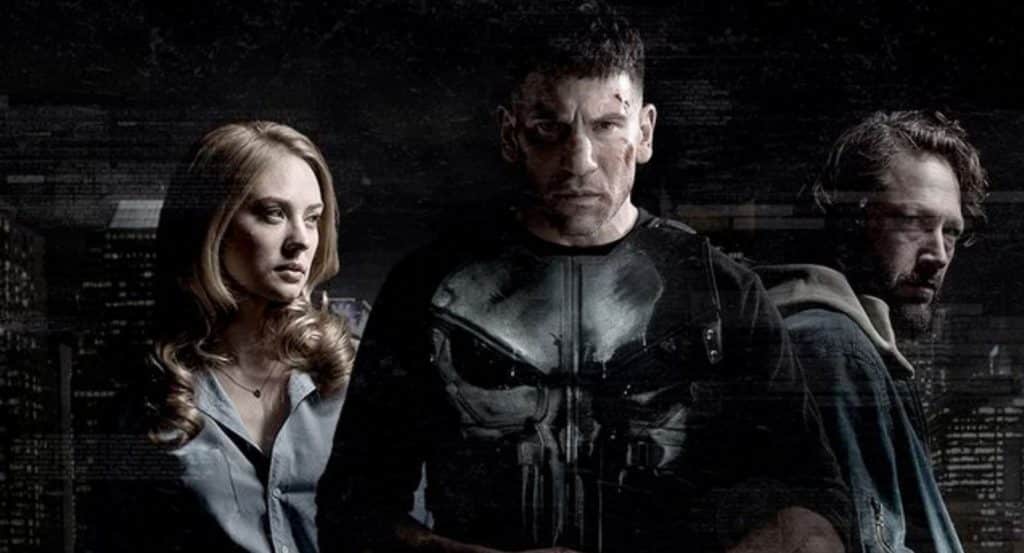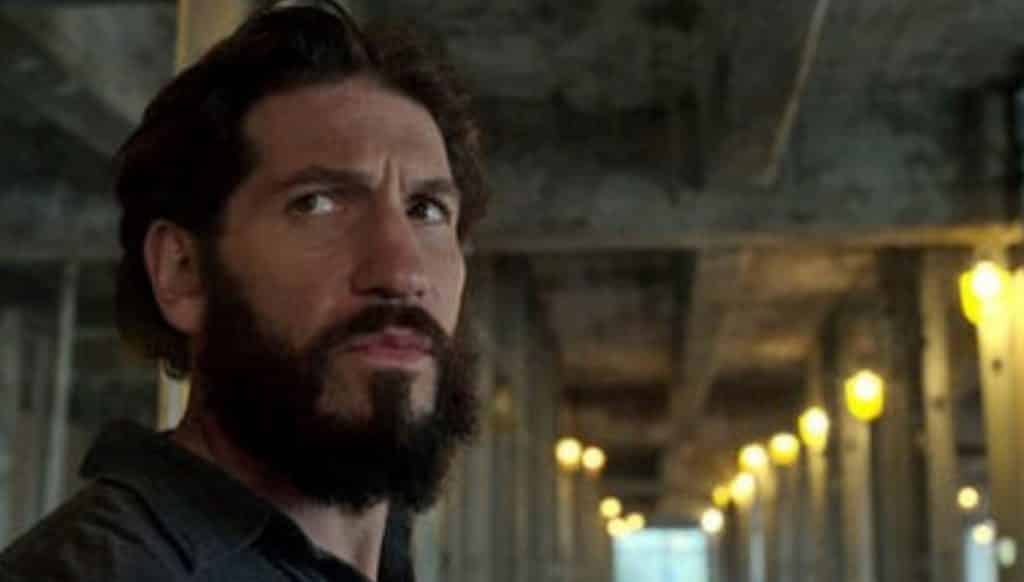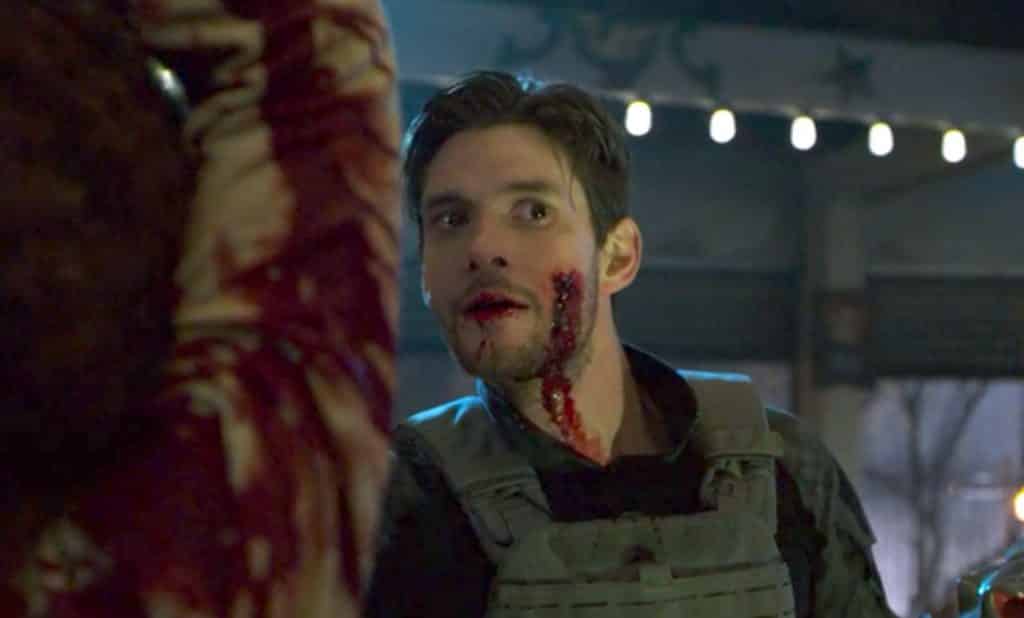The long wait is over, and Frank Castle’s solo series is finally here with us. Marvel’s The Punisher finally gives us the long-awaited show for the iconic character, after we got glimpses of Jon Bernthal’s solid portrayal of the Marvel Anti-Hero in Season 2 of Marvel’s Daredevil. While trailers for the show were met with a hugely positive response, it was delayed due to a tragic shooting in Las Vegas.
Marvel ultimately decided that it was still worth releasing, and thankfully, it didn’t disappoint. With action, drama, great acting and more – it definitely delivered.
So lets kick off our (mildly spoilerific) episode by episode guide to the whole first season.
Episode 1: 3 AM
Episode One opens with a moody acoustic guitar set from our haunted protagonist. A mixture of family flashback and modern-day reflection, it’s clear the series is going to do a fair old bit of time-hopping and focusing on the reasons that Frank finds himself where he is now.
When that’s done and dusted, what follows it a quick exercise in tying up the loose ends from the events in Daredevil Season 2. Decked out in his signature skull-painted body armor, the action flits between Alabama, Juarez and New York, as the surviving members of the Cartel, the Irish Mob and the Dogs Of War are taken out in slick and spectacular fashion.
In what seems a slightly odd move, once Frank has settled these accounts it’s into the furnace his vest goes, the identity of The Punisher seemingly laid to rest with his need for vengeance now satisfied. Then it’s straight into the series titles, an enjoyable mixture of slow-mo CGI weapons porn, and a Sons of Anarchy style montage.
Fast-forward six months and we find Frank having grown a beard, trying to get by as part of a demolitions crew in New York. Still haunted by memories, dreams and visions, he spends his days trying to resist the urge to kill the scumbags he works with. As the trash talking and aggressive banter towards him begins to escalate, it doesn’t need a rocket scientist to figure out this won’t end well….
Whilst events start to escalate back on the building site, we then get to find out what’s going on elsewhere in the storyline. Frank’s Marine buddy Curtis Hoyle is running a rehab group for other veterans, who are all pissed that the government has now abandoned them to die on America’s streets.
At the same time, Dinah Madani arrives at Homeland Security overshadowed by events that unfolded whilst she was out in Afghanistan. Turns out she wants to investigate what Ray Schoonover’s unit had been doing in country, but nobody there or back home wants her doing that. She’s all drive and sass. New partner Sam Stein (who’s also on the departmental shit-list) is all depression and wisecracks. These are very exciting echoes of the seminal MAX storyline, which spells bad news for Sam…
With the stage set, it’s time to get the series going, and the last 20 minutes then ramp up a gear, demonstrating that it’s never a good idea to be an friend of Frank Castle, and showcasing several hyper-violent action sequences that tease great things for the upcoming episodes.
The violence is extreme and unflinching, but not overly gratuitous, and is wonderfully reminiscent of the classic PS2 Punisher game. Right down to the bloody final finishing moves. Devoted fans of the character will be delighted to see Frank’s birth surname introduced, as well as the infamous Gnucci gang (no doubt we’ll meet Ma Gnucco further down the line).
Events then end with another big introduction, as Micro crops up to watch Frank abandoning this identity and making good his escape. Despite the necessary slower pace that dominates the central part of this opening episode, the start and finish are exactly what we wanted and needed to see. There are Easter eggs from the various classic Punisher imprints everywhere you look, and no holding back on the part of the showrunners.
Episode 2: Two Dead Men
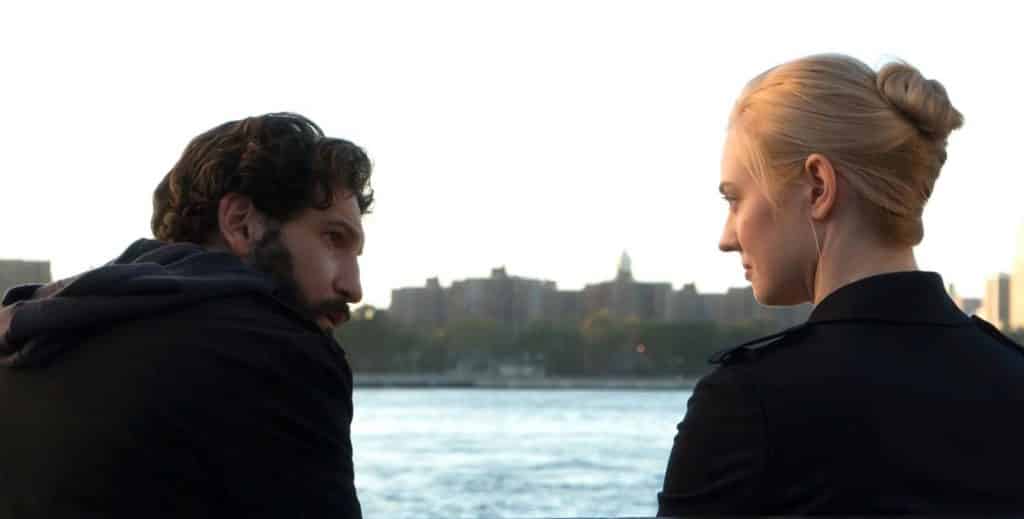
After the intense bursts of violence that bookended Episode 1, there’s a marked change of pace for the show’s second instalment, and just the slightest hint that the standard 13 episode format that Netflix imposes on its Marvel properties may require a couple of filler episodes to pad things out.
Fans of the MAX imprint might find themselves bristling slightly as it becomes abundantly clear thisPunisher is not the finished article they will have been wanting to see. The Frank Castle we saw back in ‘Daredevil’ was a remorseless and focused killing machine. The Frank we see now is more confused, with need of reassurance and validation from his support network. We see him visiting Hoyle for advice about what he is doing, and cracking slightly nervous jokes when seeking help from Karen.
Proceedings open on familiar territory with another flashback, as Frank’s nights remain haunted by the ghosts of the past. Then (now being unemployed) it’s off to the local diner for breakfast, and a hope things end better for our hero than the last time we saw him visit a diner. It’s here we’re finally get to see Micro reveal himself.
Whilst not the best physical fit for the character, Ebon Moss Bachrach totally nails all the elements needed for a great Micro. Living in a batcave-esque factory unit, he shuffles around eating from a cereal bowl, still dressed in his dressing gown and slippers. But this slobby nature is offset by a showcase of his skills. With access to the entire New York camera grid, including facial and walking gait recognition, he’s a formidable foe and/or ally.
He’s also not stupid, building clever safeguards into his approach towards contacting Frank, as the whole episode turns into an escalating game of cat and mouse between the two. Elsewhere, essential plot elements are introduced and slotted together in what seems like an overly obvious and easy manner. It’s Micro pulling the strings here, influencing Karen, Dinah and Frank as he works towards an unknown endgame.
Schoonover’s precious revelation that Frank is no angel, and may have directly caused the deaths of his family is back with full force, shocking Castle to the core. The events back in Kandahar loom large, tying Dinah to Frank in a manner that can only lead to a difficult confrontation between the two far further down the line.
We also get to meet Billy Russo, all confidence and charm. He’s quick to reveal his history with Frank, even quicker to try and get Dinah into his bed. Within 30 seconds of meeting him it’s clear he’s going to be an infinitely better Jigsaw than the cartoonish pantomime villain we saw back in ‘Warzone’.
This whole episode has a very ‘nuts and bolts’ feel to it, but it’s not without action, as Frank pays a nighttime visit to another of the men responsible for the carousel massacre that claimed his family. The manner in which he finally locates Micro is admittedly clumsy though, and straight out of the ‘Dirty Harry’ playbook. The slow pacing of the episode is carried through by the future potential it unlocks, and the thrills we saw in episode 1.
Episode 3: Kandahar
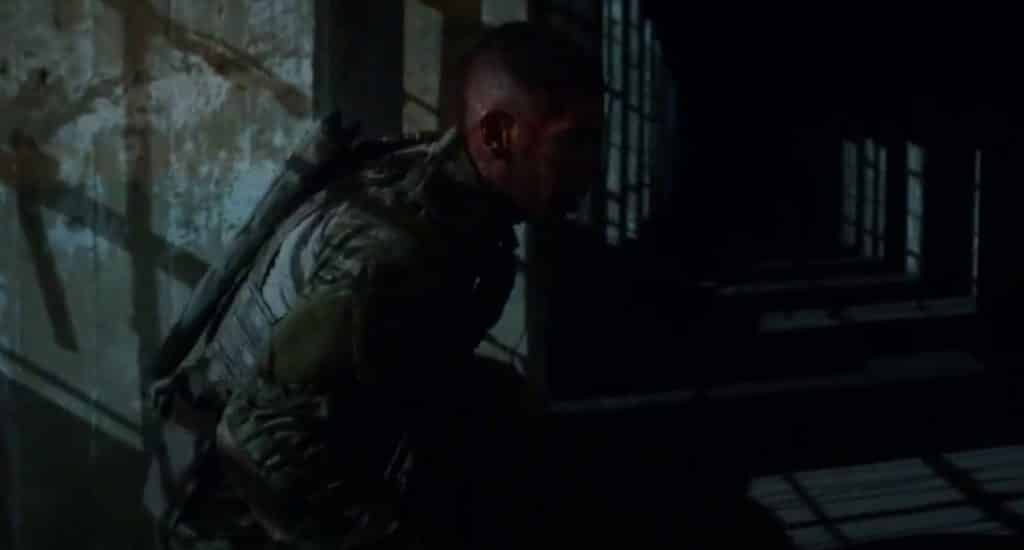
Staggering its content between what previously happened in Afghanistan and modern day events, this episode is a real emotional rollercoaster of a ride, and a clear indication of what’s going to be coming at the viewer further down the line. It asks searching questions not only of the current political situation that America finds itself in, but also of the essence of Frank Castle himself.
People, this is GOOD stuff.
This is a show that by episode 3 has already elevated itself way beyond the levels of all previous five Netflix/Marvel shows with its combination of brutal violence and deep emotional heft. It manages to remain loyal to the origins of the comic book character, but also to bravely pursue the new path the show has taken in making Frank more directly responsible for the death of his family.
We start with a rendition sequence which beautifully echoes the famous ‘popsicle torture’ scene from the 2004 movie. As Micro’s backstory evolves things start to make for uncomfortable viewing. Whilst Frank blames him for the events that took his family, in turn Micro blames him for starting those events in the first place. You’re left with the impression that maybe it should’ve been this episode that was called ‘Two Dead Men’.
The time-hopping nature of the episode also delves heavily into several other character backstories, primarily Billy Russo’s. Ben Barnes impresses as the modern day version, oozing the charm and seduction needed to nail Billy The Beaut, as he pursues his mysterious agenda. Unfortunately, he somewhat lacks conviction as a social forces soldier though, and this is perhaps an alteration too far for the Jigsaw character by the show-runners.
Things switch up a gear at the halfway mark with the realisation that we’re finally going to witness the events described by Schoonover back at Frank’s trial. We also get to meet Rawlins, who may as well have the word ‘scumbag’ tattooed on his forehead as he enters proceedings. Essentially playing out here as a pantomime villain, it’ll be intriguing to see how far the makers will push the character in the later episodes.
As the subsequent story of Operation Cerberus plays out onscreen you feel your pulse quicken. This is not only a great bit of television, it’s also a brilliantly updated version of the character’s Vietnam origin story. It’s hard to put into words how emotionally investing this series is. Every time one Frank’s memories of his wife waking him up starts you find yourself screaming at the screen, willing her to make it through just one damn dream sequence.
So where do we go from here?
Episode 4: Resupply
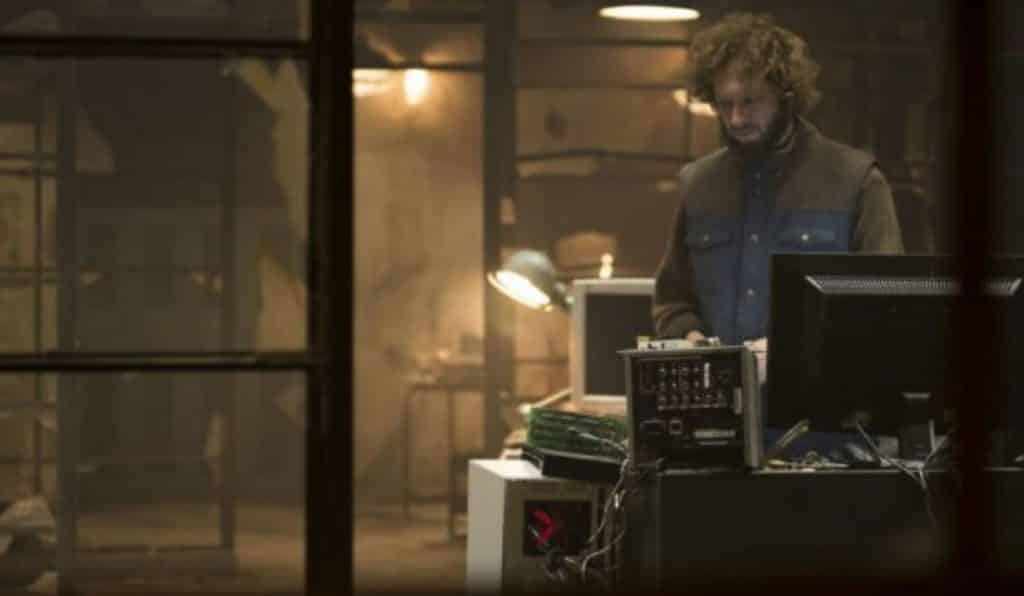
Despite the highly thrilling and compelling nature of the previous three installments, as I sat down to start number four I was still waiting for the series to land some kind of knockout blow. And, do you know what? By the end titles of this episode I finally found myself sat there with a pounding heart rate and head full of mixed emotions as the story finally hit the stride I’d been willing it to.
The arrival of Hell’s Kitchen’s least successful hustler in the opening stages was the first sign that proceedings had arrived at a point where context could be put to bed, and business was now the order of the day. Poor Turk Barrett once again ends up walking away from a deal with no profit and a significant headache, but surviving his first encounter with The Punisher.
Turk’s not the only one getting a headache either. As Dinah slips further and further into the murky politics of Homeland Security she feels a bit more of her soul slipping down with her. Sure, her relationship with partner Sam is improving, but her relationship with the department as a whole is fast going the other way, forcing her to make a desperate play.
Elsewhere it becomes clear that Frank might not be the beating heart and conscience of the show. After all, he’s kind the reason why everybody finds themselves in the current predicament they are in. Whilst the cat and mouse game he’s been playing with Micro instead morphs into an ‘odd couple’ relationship, mentally scarred veteran Lewis is bought forward to be the true victim of the series.
One of the reasons this show is just so damn compelling is the larger questions it is asking. Where previous Punisher projects have stopped short at questioning the morality of Frank’s actions, this one operates on a higher level. It wasn’t war that made Frank; it was politics. And rather than simply glorifying gun culture as some observers have claimed, the writers ask searching and painful questions about the US government and army’s treatment of its enlisted men.
There’s another tease of Billy, and further questions about what exactly he’s up to, but these are a sideshow for the adrenaline-pumped final third of the episode. As a blindfolded hostage gets to overhear Frank clearing a garage full of hoods in order to procure a ride, you can almost smell the blood, piss and motor oil.
There’s not even a moment to pause before Frank is descending into the middle of an arms deal like he was Spider Man, incapacitating antagonists and agents alike using gloriously non-violent means. Things all go a bit ‘Fast and Furious’ for a few tense minutes, and then its time for an ugly confrontation, and some even uglier home truths.
Already, this is easily the best Marvel TV adaptation ever…
Episode 5: Gunner
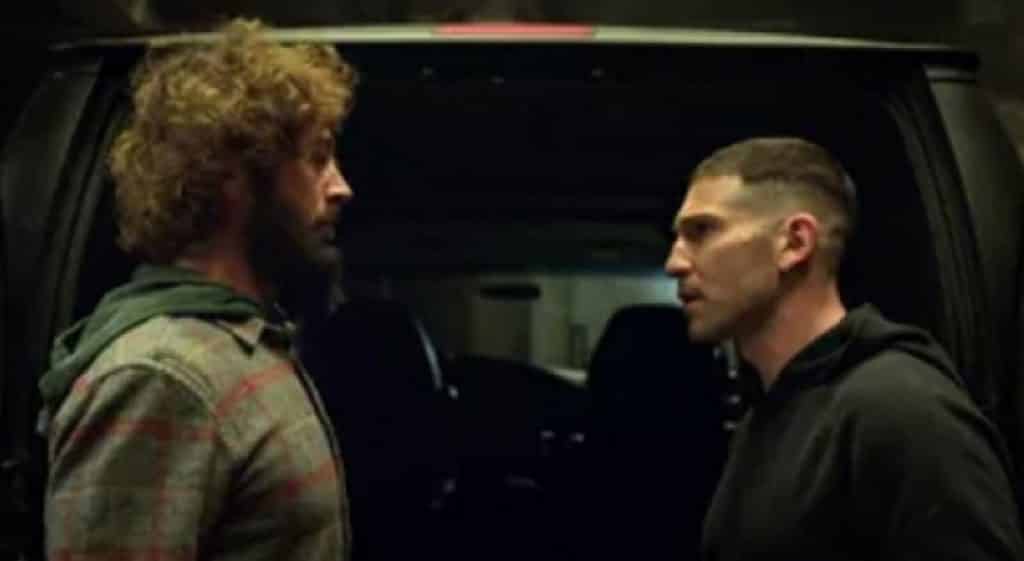
The visible uplift in pace that we suddenly experienced back in episode four shows not sign of stopping here, as revelations and events unfold at a blistering pace. The number and manner of onscreen deaths is ramping up considerably with every passing episode, but this increase in gore and brutality is brilliantly offset by the humorous ‘odd couple’ nature of Frank and Micro’s evolving relationship.
Bickering like a married couple, the interactions between the two societal misfits serve not only as a touch of light relief, but also to dig down to the very core of their characters. Micro treats everything as a sick joke, firing out sarcasm and wisecracks, whilst trying to deal with the shocking reality that he is hopelessly outside of his comfort zone. Going into this team-up he had assumed that he would be the one in control, and has found now he has very limited options for trying to influence his new unhinged partner.
In comparison, Frank is desperately trying to adjust to actually having somebody to talk to for more than 30 seconds (the point at which he usually kills them). Simple conversations with Micro such as where things are kept in the hideout to make a sandwich highlight how hard he now finds social interaction. This is also illustrated with the deeply uncomfortable game he is being forced to play with micro’s family.
Elsewhere, despite appearing to be more and more out of her depth, Dinah’s relationship with Billy proves that she’s neither a shrinking violet, or a victim. We also get to witness the slimy and murky layers of power that Rawlins is using to cover up his past misdemeanours. Just seeing him onscreen for five minutes of screen-time makes you want to pause proceedings to go and have a good shower.
As with the last episode, though, everything here is just window-dressing for a sickeningly enthralling final twenty minute fight sequence. Combining the most successful elements of Aliens and Predator, Frank and Gunnar take on a pursuing Special Forces Unit, with eye-flinching consequences.
The gloves and safety catch are finally off here, and as a viewer the show assaults you with the harsh truths of modern warfare. On both a physical and psychological level; America has abused and then abandoned her military sons and daughters. Whilst previous Punisher incarnations have shown Frank as a near-psychotic lone wolf, this series is brilliantly using the bond he shares with his fellow soldiers to highlight his tortured and broken psyche.
But the highlight of this hour of pain and punishment is astonishingly not to be found during that last 20 minutes. Halfway into proceedings, Frank shares a story about his son whilst talking to Karen. It’s an emotional bombshell that genuinely brings tears to your eyes, getting right down to the reasons this broken man is pursuing the quest he is, and will never show any mercy to the people who took his family from him.
Honestly, please don’t let this show ever end…
Episode 6: The Judas Goat
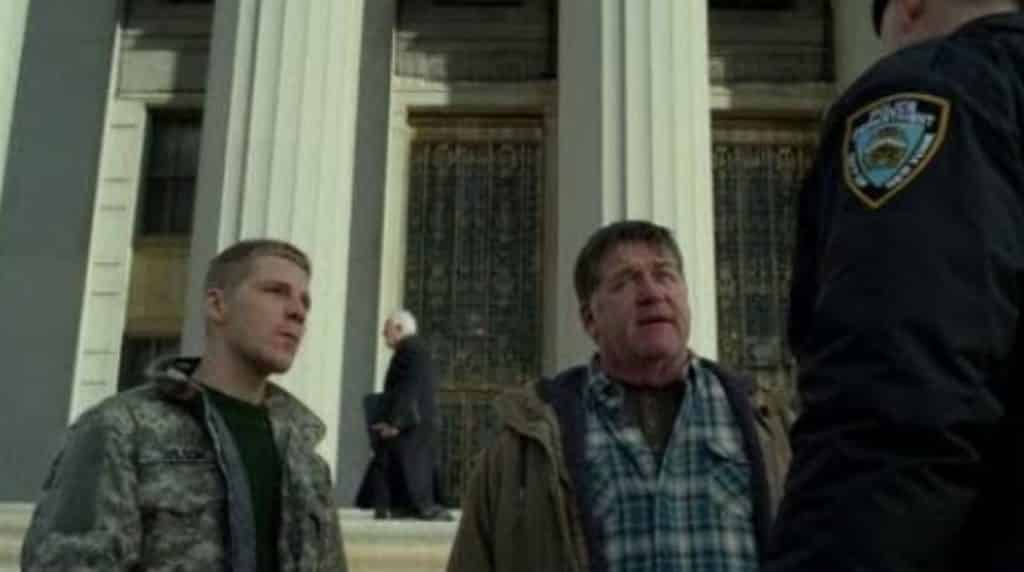
It was inevitable that with the large amount of action and drama that had been crammed into the last two episodes that the show would need to find some time to pause in order to catch its breath. And so it is that we kick down a few gears for this episode, and reflect on how individual characters are being affected by the events that have been taking place so far.
Lying dying from the effects of sepsis, Frank’s feverish mental state is slowly deteriorating, with the horrifying dreams he suffers slowly growing in intensity. With the decision not to include Claire Temple in this series, it’s therefore handy that Curtis used to be a corpsman, and can handily step in for her. Cue some eye-watering battlefield triage, that would put ‘ER’ to shame.
Curtis continues to be the dependable touchstone for the narrative to come back to. Slowly recounting his army experience as Frank hovers between life and death, he delivers a speech that rivals Stick’s haunting description of the Black Sky in terms of its intensity. For all his care and compassion though, it seems his ability to offer meaningful help for Lewis is gradually fading away.
Things continue to go from bad to worse for the young damaged veteran. Seemingly manipulated and lied to by everybody he’s ever known, all the warning signs point to a sudden and violent downturn in his mental health, which is exactly what plays out in shocking style prior to the end of the episode. Affected by war in much the same way as Frank, his path is both very different and very similar to the Punisher’s in equal measure.
Despite her no-nonsense attitude and tough-girl exterior, the pressures of her situation drive Dinah into Billy’s arms. And it’s very much his episode. Up until now, he’s done nothing even remotely close to justifying why he’ll turn into an iconic Punisher villain. Seemingly besotted with her, and fiercely defensive of Frank, you almost find yourself starting to root for the former soldier, until the closing episode stages expose the sinister double game that he’s playing.
There was always going to be a risk that, much as with Iron Fist, the 13 episode standard format would not be kind to this show. The makers, though, have not wasted a single minute of screen time, saturating the project with the raw human emotion that Iron Fist and Luke Cage were lacking. The scenes involving Micro’s young family are as heartbreaking for the viewer as they are for the helpless Micro, and little touching gestures such as Frank sharing a beer with his old war buddy escalate this incarnation of the character well above his peers.
Right, now out boy’s all mended, let’s get back at it…
Episode 7: Crosshairs
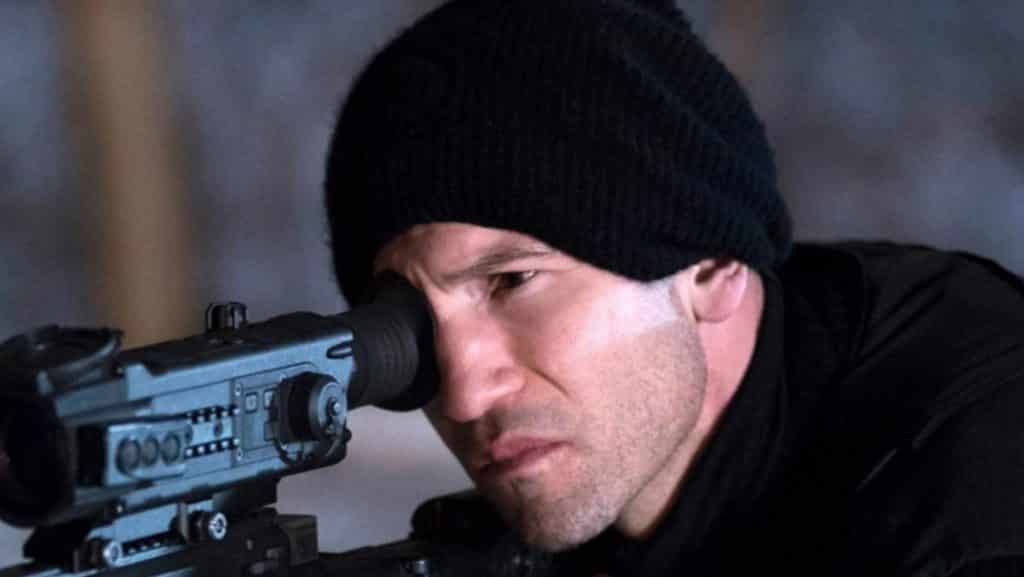
Having spent the last episode recharging our batteries, we’re right up at it and into the thick of things here, as the Punisher throws himself back into the fight, determined to get hold of the people he holds responsible for the deaths of his family. There’s literally not a moment to spare either, as a few pull-ups and stomach crunches later, Frank’s infiltrating an active military base in pursuit of one of his old CO’s.
There’s a wonderful simplicity to the way that Bernthal’s version of the character is presented. Whereas previous incarnations have sprung traps and ambushes out of nowhere, here we get to see the methodology and effort that go into Frank’s movements. Loading up with what he needs from the gradually evolving Battle Van, he casually discards a couple of smoke grenades like a mic drop, before taking out a room full of armed mercs in spectacular fashion.
The use of the laser sights in the smoke-filled room makes for compelling viewing, as you strain to see which of the moving figures is not who he seems to be. With that done, there then follows a tense moment where it becomes apparent that Frank’s reputation is as dangerous as any weapon he might carry.
It’s a fairly frustrating episode from Billy’s point of view, but now he’s finally been established as a bad guy, the producers are letting him fully off of his narrative leash. His love for knives and blades is allowed to shine through with one memorable kill, and the manner in which he charms and manipulates Madani is as repulsive as it is impressive.
Poor old Lewis’s descent into madness takes a whole new and unexpected turn. Watching his father unable to connect with him and desperately flailing for a solution is horribly relatable to any parent. The beleaguered situation which he and his fellow vets find themselves in is in sharp contrast to the perverted luxury of their former commander, with the show still calling into question the manner in which the US military use and discard their personnel.
Ebon Moss Bachrach continues to impress with his portrayal of Micro, really making the role his own. Fighting to force his new ally to operate at his pace and agenda, he actively challenges Frank’s entrenched mindset to simply attack and eradicate all and any problems he encounters. It’s good advice too, as in the closing stages of the episode, it becomes apparent that Rawlins will prove to be a tougher obstacle to overcome than first thought.
Episode 8: Cold Steel
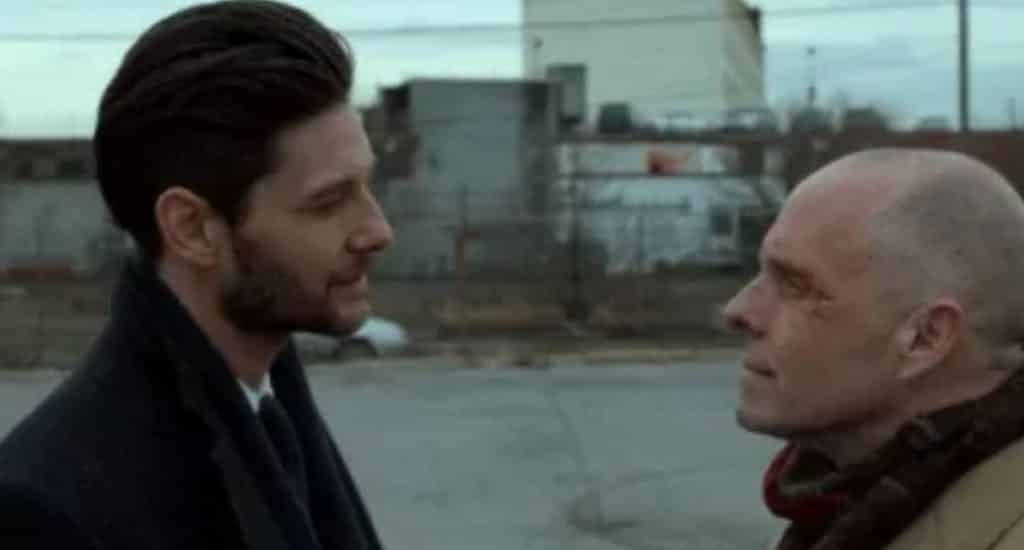
The clue of where exactly things are going with this episode is in the title. ‘Cold Steel’ makes no attempt to hide the fact that that this eighth instalment is going to feature a heavy amount of physical and emotional pain. And, boy. Does it deliver on both fronts…
The second half of the episode is truly torturous to watch, as all of the key players are subjected to a sizeable amount of pain. Prior to that, the start is somewhat perfunctory, as Frank continues to make significant inroads in his quest to uncover and locate corrupt spook Rawlins.
It’s revealed that this incarnation of the Punisher villain is notably different to the MAX original. The Bill Rawlins of the Netflix version is a senior CIA Officer from a wealthy background. A million miles from the scumbag back alley brawler depicted in the comics.
It’s still hard not to choke on the sheer amount of grease and slime that he oozes every time he’s onscreen, particularly in the scenes he shares with Russo. The two antagonists trade incendiary barbs with each other, whilst they circle like a pair of sparring boxers. Russo’s backstory is also expanded, teasing horrendous hidden depths that explode in the episode’s closing stages.
For Frank’s part, the discomfort he feels in having to handle Micro’s family is palpable. As he tries to cope with Micro’s rebellious son and lonely wife, he struggles to find coping mechanisms, all the time having to deal with those actions and the consequences of Micro witnessing them.
The situation also allows the writers to draw out more of his humanity. He’s a dab hand in the kitchen (paying a cheeky homage to his Vietnam era origins), he likes a drink, he’s good at playing ball with kids. This is why a TV series was so much more appropriate as a means of perfecting this character. The previous movie versions failed because the portrayals were overly simplistic. Frank’s development here is deep and layered, prompting empathy and sympathy for him.
But no sooner have the misty-eyed memories of Frank’s marriage settled than we’re thrust into the brutal consequences of Dinah’s flailed political gambling. She severely misjudges what she is up against, and this misjudgment costs here dearly. It also allows Ben Barnes to fully let loose and show the truly terrifying hidden side to Russo’s personality. As he sits gently bathing Dinah in the closing stages you don’t know wether to cry, or hurl the television into the nearest wall in frustrated anger.
At times this is becoming upsetting and unsettling to watch. But in the best kind of way…
Episode 9: Front Toward Enemy
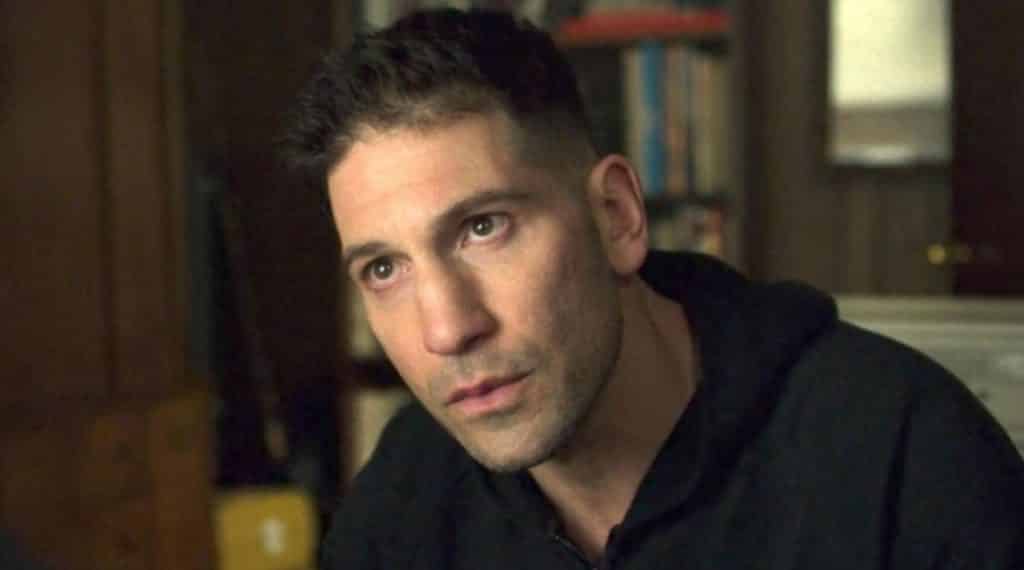
Frank’s violent quest to avenge his family has been progressing at a comfortable and reliable pace for the last eight instalments, with all of the necessary players and components slotting into place nicely to put him face to face with his main target, Rawlins. And then with brutal and unexpected fury, the ongoing narrative suddenly takes a completely unexpected path.
For several episodes now, there’s been a nagging question mark about where exactly troubled young Lewis’s sub-plot was headed. That question is answered within the first two minutes of episode nine, as his campaign against the federal government is very publicly announced, in scenes reminiscent of the opening frames of the ‘Kitchen Irish’ run.
Lewis’s actions appear to be the harsh consequences for a collective series of misjudgements on the part of the other main characters. Frank never believed his personal quest might inspire others. Curtis never thought that he’d be unable to prevent Lewis from crossing the line into madness. Dinah never believed she’d cause her department to be paralysed and ineffective in their hour of need.
It’s the bloody wake up call they all had coming to them…
This new tense diversion from the regular proceedings shines a deeper light into the psyche of several key players. Micro very much takes on the role of an Alfred to Frank’s Bruce Wayne, trying to counsel and advise the man his supports into not making the situation worse. In terms Castle himself, it’s interesting to note the disdain he holds for bombs and IEDs, things his comic counterpart would use with frightening regularity.
Another character now thrust into the fore ahead of Frank is Karen. It’s great to see her being used as the opposite of a damsel in distress. She’s strong, vocal, surprisingly pro-gun, and displays genuine affection and care for this man so reviled by the rest of society. It kinda makes you wonder where Matt Murdock now fits into the picture.
But the episode rightly belongs to Curtis Hoyle. For so long a sensible and condemning voice on the sidelines, here he’s given a chance to shine. Trying to fix things without involving Frank, he ends up savagely half beaten to death with his own leg, and seconds away from being reduced to mincemeat. This then sets up possibly the most emotional sequence of the series to far, as both his and Frank’s souls are laid bare in a nail-biting speech explaining their past military service together.
From there, with the show already having previously gone a little bit Fast/Furious, it now chooses to go a bit GTA, before Micro finally decides enough is enough, and to take actions into his own hands. The episode closes with the game-changing realisation that Frank’s secret is out, and the Punisher is one again Public Enemy Number One.
Shit just went and got very real…
Episode 10: Virtue of the Vicious
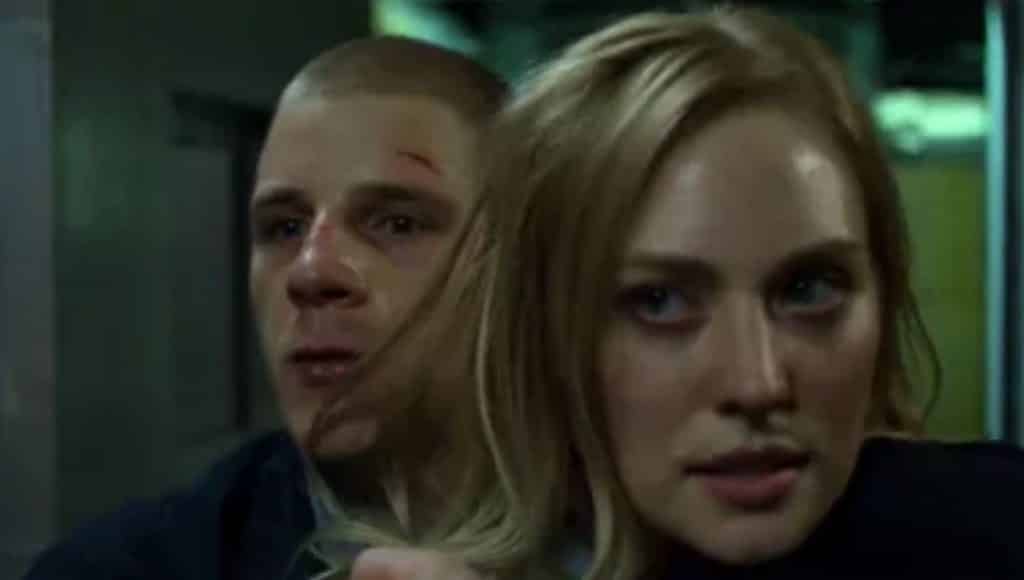
Just when you think you’ve got this series pinned down, it laughs in your face and pitches you a total curveball. We saw it last time round with the sudden diversion down into Lewis’s subplot, and now we have it again here with an intriguing new episode format that brings the mentally unstable veteran’s part in proceedings to a sad and lonely end.
Unfolding Rashomon-style, we’re thrown unprepared into the carnage and aftermath of Lewis Vs Frank. The story is then drip-fed through from the different perspectives of a whole host of characters, with the truth only revealed as their lies and inaccuracies are laid bare. This is exactly the creative shot in the arm the show needed at this point, and another classic example of why it stands head and shoulders above the competition.
Opening with a beautiful metaphor exposing the flaws in his beliefs, Lewis tries to free two caged birds, who refuse to trade the safety of their world for the uncertainty of the freedom he offers. It’s apt, as nobody is ever going to want the freedom he’s fighting to get for them. Something that will be sadly apparent by the time the end credits roll.
It’s a joy to see not only Karen, but also Daredevil regulars Brett Mahoney and Mitchell Ellison making appearances. This anchors the show in the wider Netflix environment, and hopefully teases more in depth crossovers in the future. In truth, though, all of the actors are window-dressing for this hour, as it’s all about the action.
Frank tears through the hotel like a hot life through butter, using every aspect of his environment to defend himself, including some pretty nifty use of a corpse to shield himself from Billy’s goons. Poor old Billy, he just does not like now being in control, his verbal sparring with Brett as tense as the gunplay between Frank and Lewis. And then things move downstairs for a nail-biting conclusion.
Now, let’s address this head on. What the hell happened in THAT moment between Karen and Frank? There’s no denying the closeness between them, and his aggressive defence of her has always teased a deeper emotional connection. Was that two people struggling to come to terms with their situation, or something more? Something old Matt Murdock needs to worry about? Either way, it was an epic move on the part of the writers, beautifully executed by Bernthal and Deborah Woll.
So, as Lewis checks out, and Frank exits the building Spidey-style, there’s a definite feeling that we’re heading into the closing stages of the series. Several main issues remain to be addressed, as well as the tying up on no end of loose little plot lines. I’m as upset to see the end in sight as I am excited to see how this plays out.
Let’s do this…
Episode 11: Danger Close
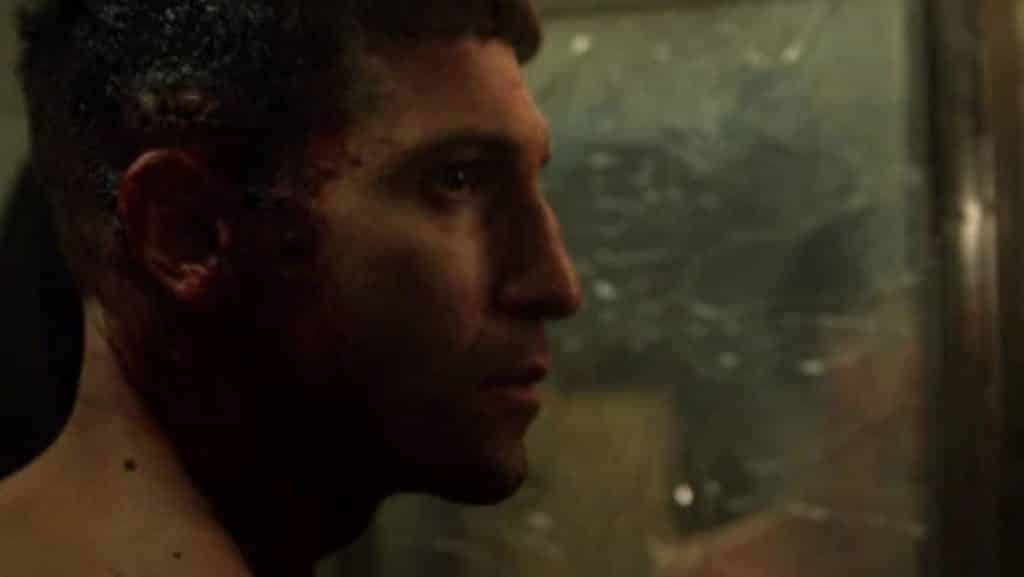
Even though this show has consistently delivered throughout the last 10 episodes in terms of action, tension and character development, there’s still the nagging feeling that the show-runners have kept the safety catch engaged. For some reason choosing to hold back this Punisher in his full wounded fury. Let me tell you, by the time the end credits for this episode roll, you’ll realise the safety is now well and truly off. Because the Frank Castle you’ve been waiting for is finally here.
The warning signs are there in the opening scenes, as Frank sits alone, trying to comprehend the level of betrayal by the one man he thought he could trust. As a nightgown-clad Micro desperately tries to motivate him, whilst stitching the gruesome head injury inflicted by Billy, the feelings of betrayal that are consuming Frank aren’t the only ones that are doing the rounds.
Having also finally realised what exactly lies under Billy’s charming exterior, Dinah reacts with the full fury of a woman scorned. What follows is the worst breakup ever, as the two parties repeatedly clash, trying to convince the other that they will be the ones to inflict the most emotional damage on the other.
The Liebermans are also trying to face up to Frank/Pete’s betrayal of their trust. What little good work Frank had managed to do in getting them back on track is suddenly undone in spectacular style, bringing Micro’s world crashing down around him. And it’s this act that ultimately leads to the return of everybody’s favourite superhero logo, as Frank sets to work with his ballistic vest and a can of white paint.
There’s some enjoyable grandstanding from Mary Elizabeth Mastrantnio, along with the slightly disappointing realisation that this version of Bill Rawlins is more a whiny bitch, than the scheming asshole we wanted, before we finally get the epic pay-off we’ve been waiting for.
Like some kind of ancient demon awoken from the other side, all greasepaint and bloodshot eyes, Frank is more animal than man. He cuts (literally in some cases) a spectacular path through a warehouse full of Billy’s goons, killing with utter indifference in methods that make the ‘Hostel’ movies look tame. Of particular enjoyment is the inventive use of a decapitated head and a hand grenade. It’s like some horrific X-rated version of Macgyver.
The blood and dust finally settle, and sat in the centre of it is the fully-formed Netflix version of The Punisher. Breathless, emotionless, remorseless. You already know that the last two hours of this series are going to be the best material that Marvel have ever produced.
Episode 12: Home
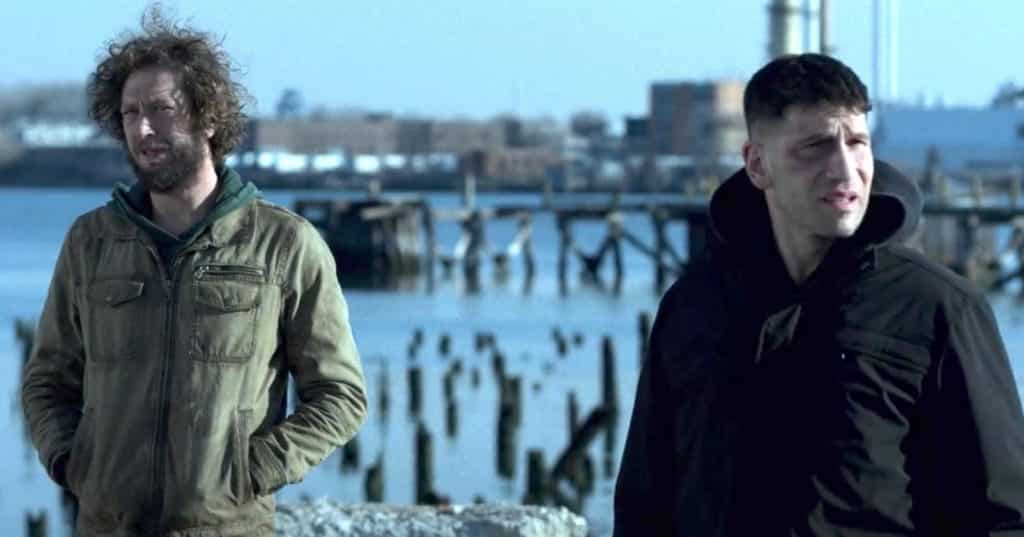
There’s a sharp poignancy to the name of this episode, as it’s also served as the title for several of the character’s most heartbreaking comic book storylines, including the ending to the iconic MAX imprint. So many of the characters involved in this story no longer have a place to call their home, and now it’s time for everybody to face up to the consequences of their actions. Whatever the cost.
For Frank’s part, this involves handing himself over to Billy in order to safeguard Micro’s family. It’s s a tense scene, but plays out exactly how you would expect it to. That done, it’s Micro’s turn to deal with the fallout from the past year of lying to his family, and the results are a joy to behold. As his wife approaches him, it’s impossible to predict if it’s a kiss or a punch she’s going to land on him, the looks on their children’s faces reflecting the simultaneous turmoil that the viewers are sharing with them.
From here things move into a dark place, as we follow Billy and Rawlins in their attempts to break the perceived cause of their misery. You physically feel every punch they land as if it was a hammer blow, watching as the force of each hit that connects with Frank throws him off into a strange mental place, with a spectral version of Maria waiting to hold him in her embrace again.
And it’s Maria’s attack on him that wounds Frank more than any physical one can, forcing him to question every action he has taken up until this point. These dream-like interactions with her are wonderfully reminiscent of the ending of the 2004 movie, as the anti-hero contemplates wether to simply just give in and go with her into the dark.
Naturally, he doesn’t, and it suddenly everything goes a little bit 28 Days Later. The music, the horrifying violence, the pints of blood. None would look out of place in the most savage of horror movies. It’s difficult as a writer to even try to find the words to describe the sheer savagery of Frank’s counter-attack, and what’s left intact of his captor when he’s finally done.
As Frank slumps to the floor, you almost feel like slumping down along with him, such was the frenzy and intensity of his action. This is the culmination of a whole series of sheer physical exertion from Bernthal, to the extent we’ve seen him change the entire look and feel of the character at will on multiple occasions. Micro’s desperate description of the dying vigilante as his ‘friend’ genuinely brings a tear to the eye.
But probably not as many as the final episode surely must…
Episode 13: Memento Mori
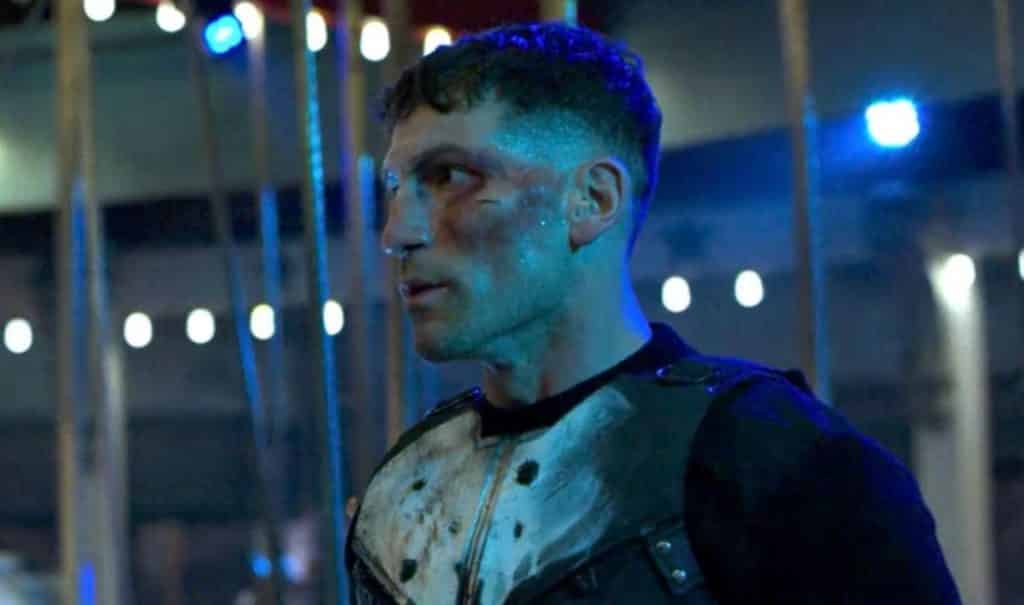
The disagreement between Dinah’s parents about how to deal with the bloodstained predicament their daughter has just dumped at their front door concisely sums up the narrative of this entire season. To one, he is a godless monster. To the other, a principled freedom fighter. This argument is exactly why this series has been such a wonderful success. In the midst of all the carnage, rather than cheap one-liners, we instead get topical and realistic debate amongst two well-developed and believable supporting characters.
For so goddamn long now, The Punisher has been the bad joke of the movie industry. No matter how hard the talented actors who portrayed the character in previous versions tried, it was never possible to sufficiently dig into the lifestyle and environment surrounding this decent soldier turned into a force of nature. The necessary people and situations were always cast aside in favour of action sequences and set pieces. Finally, after a thirteen hour period, no-one is laughing anymore.
This last episode truly is a sprint to the finish line. No sooner has Dr Madani finished his Three Kings guerrilla surgery on Frank’s lung, than we’re cutting to Billy making his escape. Slicing his way through his apartment block like a T-1000, he leaves a pile of corpses in his path, framed walking away from the burning building in a manner identical to Frank at the end of Daredevil. Then from there it’s to Curtis’s house and an ambush that literally comes out of nowhere. The bullets impacting before the falling coffee cups have even had chance to hit the floor.
Whilst Curtis’s week couldn’t get much worse, for the other supporting characters things are starting to look decidedly rosier. Madani’s plot ties up in a disappointedly unrealistic and convenient manner, considering all the shit she’s just caused, and kinda leaves you wishing they’d gone with a straightforward Kathryn O’Brien character instead of a new lite-version. The Lieberman’s dysfunctional bathroom reunion is thankfully more realistic, and a moment of genuine relief before the inevitable final showdown.
And what a showdown it is. The final loose end to be tied up, as we get to see exactly how Billy transitions into Jigsaw. It’s slow, methodical and torturous to watch. The audible damage that’s being caused to skin and bone is matched by the psychological damage the scene causes the viewers. It’s a satisfying and unsettling thing to behold in equal measure. You do not fuck with Frank Castle.
After that it’s a case of some basic housekeeping, before the series checks out on exactly the right note, at exactly the right point. Jon Bernthal’s version is relatable and realistic on levels never seen before. He’s also very different to the version we first met last year, demonstrating how with more time and appearances this character will only go on to get better.
Now, hurry the hell up and film us some more episodes already…

